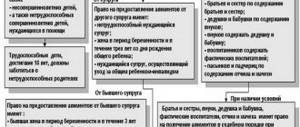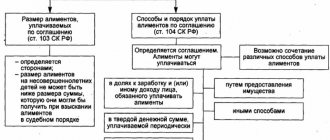Author of the article: Yulia Kaisina Last modified: January 2021 44998
The concept of childhood in the everyday sense is quite vague and indefinite. But there are many situations when it is necessary to clearly define the age limits. Purchasing discount tickets, paying benefits, the responsibility of minors before the law, the ability to make transactions on their own behalf and get married - for all this there is a specific age limit. Up to what age are children considered children by law, and in what cases age standards may change.
Age periods of development
The Constitution of the Russian Federation clearly defines the concept of a child as a citizen who has not reached the age of majority, that is, 18 years of age, and distinguishes 2 age periods from a legal point of view:
- From birth to 14 years. Prescribing by law the age up to which children are considered minors makes it possible to determine its status and indicate incapacity before the law. That is, during this period, his legal representatives act on behalf of the child - both parents, one of them, guardians, adoptive parents.
- From 14 to 18 years old. During this period the child is a minor. The scope of his rights and obligations changes, he is endowed with partial legal capacity. Upon reaching 18 years of age, a citizen loses the status of a child and becomes an adult.
The nuances of flying with children
Modern aircraft are equipped with everything necessary for a comfortable flight for passengers with children of any age. For flight safety, the aircraft seats are equipped with special child seat belts. When landing or taking off, children may experience stuffy ears. To prevent this from happening, it is necessary to give a bottle of drinks. If children were flying from a cold climate zone to a country with a maritime or continental tropical climate, then the children should be dressed in functional clothing, some of which can be easily removed.
Legal definition of the concept of “young child”
In order for the rights and responsibilities of a child to be legally regulated, there are special legal articles that prescribe the definition of concepts relating to children:
- Article 54 of the Family Code of the Russian Federation – “A child is a person under 18 years of age.”
- Article 28 of the Civil Code of the Russian Federation is defined with the concept of the age of a young child - “... a minor who has not reached 14 years of age.”
- Article 28 of the Constitution of the Russian Federation defines the concept of a parent as a person obliged to take care of the child.
General provisions
At the same time, within this age period there is also a gradation associated with a gradual increase in the rights and responsibilities of the child. In addition, the benefits that parents of a minor can enjoy are gradually being reduced.
These include as privileges guaranteed by law:
- child benefits,
- Holiday to care for the child,
- right to tax deduction, etc.,
- benefits provided by different organizations. For example, large discounts or free admission to entertainment events, provision of services by hotels, transport companies, etc.
Rights of young children
From an early age, children need to be instilled with the concept of a citizen, tell him about his rights, and convey information in a clear and accessible form that, along with adults, he must bear certain types of responsibility. Children's rights can be divided into several types: property, non-property and age-dependent. Let's take a closer look at each of them.
Property rights include the following:
- material support from parents and other family members;
- benefits provided by law, including maternity capital;
- own income, property acquired with it;
- cohabitation with parents, co-ownership of common property.
Moral rights include:
- possession of a surname, name, patronymic;
- the opportunity to receive education in preschool, secondary, special, and higher educational institutions;
- health protection;
- family life and communication with relatives;
- organization of recreation and leisure;
- expressing one's own opinion;
- respect for interests and protection of rights.
Age is another criterion that influences the increase and expansion of children's rights:
- At 2 months, a newborn has the right to preschool education.
- From the age of 6, a child has the right to make small household transactions aimed at obtaining benefits free of charge and independently manage the funds provided to him by his parents or legal representatives.
- 6.5 years is the age when a child has the right to receive primary education at school.
- A child can independently join children's public associations at the age of 8 years.
Are you interested in the age at which young children in the Russian Federation cannot express their opinions? Up to 10 years. But after that they have the right to:
- expressing his opinion when resolving intra-family issues affecting his interests;
- decide which parent he wants to live with after the divorce;
- agree or not with the change of your last name, first name, patronymic;
- participate in the restoration of parental rights;
- whether or not to agree with your adoption, placement in a foster family, or appointment of a guardian.
To summarize, it can be argued that a child acquires rights as he grows up, in stages. At a young age, he has the right to life and liberty, personal integrity and social protection, name and citizenship, family and education, primary assistance and protection, express his opinion and enjoy property rights.
From what age and until what age is a child, teenager, and so on.
Child. CHILDHOOD is the period of human life from birth to adolescence.
This period includes: infancy (from birth to 1 year), early childhood (1-3 years), preschool age (3 years - 6-7 years) and primary school age (6-11 years). Childhood is a period of intense biological, social and psychological development. In childhood, especially in preschool and primary school age, the prerequisites for readiness to participate in the social and labor life of adults are laid.
This readiness is ensured by training and education, the child’s assimilation of the experience of humanity, the achievements of its material and spiritual culture. Along with common features, childhood among different peoples and nationalities has some characteristics that are caused by geographical, national-cultural and other factors.
People form in a child traits, properties, habits that meet the norms and requirements of the system of values and traditions operating within a given culture, adapt to generally accepted ADOLESCENCE (adolescence) - the period of ontogenesis (from 10-11 to 15 years), corresponding to the beginning of the transition from childhood to youth.
Adolescence is one of the critical periods in children's lives associated with fundamental changes in the sphere of consciousness, activity and systems of relationships.
This stage is characterized by rapid human growth, the formation of the body during puberty, which has a noticeable impact on the psychophysiological characteristics of the teenager. The basis for the formation of new psychological and personal qualities of adolescents is communication in the process of various types of activities. The change in the social development situation of adolescents is associated with their active desire to join the world of adults and the orientation of behavior towards the norms and values of this world.
A characteristic new development of adolescence is a *sense of adulthood*, as well as the development of self-awareness and self-esteem, interest in oneself as an individual, in one’s capabilities and characteristics. ADOLESCENCE is the period of a person’s life from 15 to 21 years.
Young men of this age stage are characterized by the uniqueness of socialization, personal activity, and the dynamism of mental processes.
There is increased emotionality, a desire for independent searches and self-affirmation in the eyes of people around. At the same time, among the traits of people of this age there are often inflated self-esteem and conceit, carelessness, and sometimes a thoughtless attitude towards health and life. This age is characterized by rationalism, a reluctance to take anything for granted.
Unconscious nihilism, as a unique form of self-affirmation of young people, requires elders to be flexible in their approach to assessing their behavior and attitude towards other people. Youth is the time of development of social maturity, movement towards a conscious life.
It is at this age that attitudes to reality, beliefs and views on the world are tested in practice, rethought and formed into a unified system of social orientations and attitudes. A person's youth is determined by "biological age" and not by date of birth. MATURITY is an achieved high level of development of biological, physiological, intellectual, volitional, emotional and moral parameters of a person.
Personal maturity is characterized by a sense of responsibility, the need to care for other people, the ability to be psychologically close to another person, and to actively participate in the life of society.
USEFUL INFORMATION: Social support for large families
The maturity of a person comes to reconciliation with himself.
Responsibilities of young children
The next question that needs to be clarified concerns the age up to which young children do not have responsibilities. In general, the entire period from 0 to 14 proceeds under the motto “More rights and fewer responsibilities.” However, a child's first legal responsibilities arise when he or she begins to attend primary school. For preschoolers, responsibilities are set by parents and other family members. Here we should talk about respect for elders and household duties, to which the child must be taught as early as possible. And from 6.5 to 7 years old, the child has the following legal responsibilities:
- daily school attendance;
- compliance with the school charter, which sets out all the rights and responsibilities of students and teachers;
- participation in the educational process, doing homework;
- careful handling of school property (parents should remember that they are directly responsible for damage to school property);
- compliance with the internal rules of the school;
- respect for the honor and dignity of all members of the school community.
Assistance to passengers with children during flights
Many airlines may provide various additional services and privileges to passengers flying with children. Children under 2 years old fly with bassinets, which can be provided to passengers provided that this service was previously ordered when booking tickets. It is worth remembering that the number of bassinets is limited, and they can only be used on board wide-body aircraft on long-haul flights. Airlines do not allow the use of their own bassinets on board the aircraft.
Children can also watch cartoons, feature films, listen to audio books and music on board the plane, which is included in the entertainment program. For flights lasting 3 hours or more, many airlines offer baby food at a time convenient for babies.
Depending on the airline, older children or teenagers may be provided with kits for fun activities during long flights. They may include coloring books, puzzles, markers, board games, etc. The longer the airline passengers travel, the more entertaining games are included in the set.
Airlines may provide additional services
Parental responsibilities
Since children under the age of 14 are considered minors, during this period their parents and legal representatives are responsible for them. They have the following responsibilities towards children:
- material;
- educational;
- health-saving;
- educational.
One’s own understanding of all parental responsibilities is not enough; they are clearly regulated by relevant laws and their failure to comply entails administrative or criminal liability.
Getting a passport at 14 years old
When a child reaches 14 years of age, that is, at the moment when the concept of “minor” loses its legal force, he is required to obtain a Russian passport. The period for receiving the document is limited to 30 days from the date of birth. The child must have Russian citizenship. The list of documents required to complete the document is as follows:
- original birth certificate;
- document confirming citizenship;
- 2 photos;
- government payment receipt duties;
- application for a passport.
The answer to the question: “Until what age are young children?” can be paraphrased as follows: until they receive a passport.
Adolescence
The onset of adolescence from a physiological point of view occurs at 12 years of age. Lawyers have their own definition. To the question of what age a child is a minor under the law, every lawyer will answer - up to 14. And after that he becomes a minor teenager by law. The teenager receives a passport, can begin official work with the establishment of a work book, open a bank account and card in his name, receive wages in a non-cash manner, go to court, and participate in privatization. For unlawful actions he will face administrative and criminal liability.
Video
Traveling with children is always a troublesome task, because parents have a lot of questions: how children fly, what conditions are on board the plane, what fees they charge, and what additional services airlines offer. All these nuances may vary depending on which airlines are chosen. Before flying with children of any age, you need to prepare and try to make traveling by plane a real exciting adventure, and not an ordeal for little travelers.
Coming of age
In different world communities, the understanding of the age of young children may differ significantly. Thus, adulthood occurs in different states in different ways: somewhere at 19 years old, and somewhere at 21. In the Russian Federation, a child becomes an adult at 18 years old. He is recognized as fully capable and is independently responsible for his actions before the law. Can enjoy all the rights and responsibilities of an adult: buy alcohol and tobacco products and vote in elections, appear on the street at night without adults accompanying him and bear administrative or criminal liability for misconduct, work full time and enter into inheritance rights. It is very important to have comprehensive information about your rights and responsibilities, to be a competent and responsible citizen.
An adult or a child: up to what age is a person a minor?
From the age of eighteen, a person is no longer a child, but an adult: he becomes an adult, receives full legal capacity, and can, without asking anyone’s permission, officially work, get married, vote, make legal transactions, but at the same time bears full responsibility for his actions.
During the period of life from birth to adulthood, a person goes through several stages of development, at each of which he has different capabilities. However, from a medical and legal point of view, these stages differ.
Constitutional and legal status of minors
In the Republic of Kazakhstan, both the young age of the child and the minor are clearly stated. The legal meaning of the concept “minor” implies involvement in a separate category of subjects with a special special constitutional and legal status. Understanding the need for a special attitude towards young children has been carried out for thousands of years: starting with the identification of a child with a thing, running like a red thread through violence against him, often leading to irreversible consequences. Finally, it gradually led to the understanding that only a humane attitude towards children can develop the best human qualities in them, and, accordingly, lead to the progressive development of all humanity. Giving minors a special constitutional and legal status, their definition into a special group under the protection of the state, refers to the creation of a special type of social relations to protect the rights, freedoms and legitimate interests of young and minor children. They are dealt with by juvenile justice.
A little about responsibility
Responsibility is the desire and ability to accept such obligations that allow you to live your life independently and take care of yourself. Responsibility is:
- civil;
- administrative;
- criminal
No type of responsibility can be identified with each other; each of them has its own specifics. Knowing the age of minors according to the Criminal Code of the Russian Federation, one can judge what responsibilities they have to the state and society. As the child grows up, the scope of the child’s rights increases and the responsibility for their observance increases. Parental responsibility is inversely proportional to his/her maturation, that is, the older the child, the less parents are responsible for him and his actions.
Child rights laws
The rights of the child are determined not only by the laws of a particular country, but also prescribed by international normative documents. The following laws speak about the basic concepts of children’s rights in the Russian Federation:
- Constitution of the Russian Federation. It provides state protection and support to childhood, motherhood and the family as a whole.
- Family Code of the Russian Federation. It prescribes the age up to which a child is a minor, provides for the observance of his rights to life, name, family, expression of his own opinion, and much more.
- Law No. 124-FZ. It talks about guaranteeing the fundamental rights of the child.
- Convention on the Rights of the Child. Effective since adoption on November 20, 1989.
- Declaration on the Rights of the Child. It was proclaimed on November 20, 1959 by a Resolution of the UN General Assembly. It sets out 10 principles that must be followed to ensure that children have a happy childhood.
By agreement
A voluntary agreement is less traumatic for the child’s mental state. This right is enshrined in Art. 23, 24 RF IC. The agreement establishes not only accommodation, but also the procedure for security costs.
For the document to be legal, it must be signed by both parents and then certified by a notary. Need 3 copies. The court receives a copy of the agreement.








